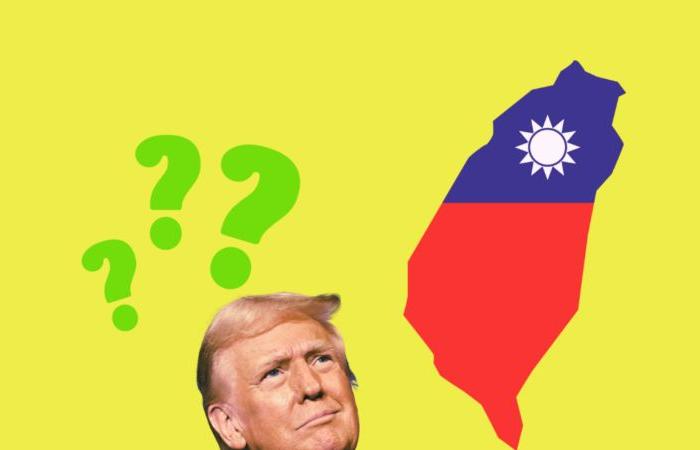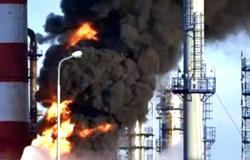Illustration created by OIwan Lam via Canva.
[Sauf mention contraire, tous les liens renvoient vers des pages web en anglais.]
This article was originally written by Brian Hioe and published in New Bloom, November 6, 2024. It is republished on Global Voices as part of a content sharing agreement.
Although the US presidential election is not yet formally declared, results currently suggest victory for former US President Donald Trump. Thus, Taiwan will soon find itself facing a second Trump presidency.
The prospect of a second term has sparked two schools of thought in Taiwan. The first underlines the risk of a significant deterioration of ties between the United States and Taiwan which had been strengthened under the Democratic presidential administration.
Indeed, Donald Trump was seen by many in Taiwan as an ally following his willingness to break with decades of diplomatic precedent in 2016 by accepting, as president-elect, a phone call from then-Taiwanese President Tsai Ing-wen. President Donald Trump had expressed some opposition to China, as Republican presidents often do.
However, the view of Donald Trump in Taiwan has gradually changed, in particular because of his purely mercantile vision of relations between the United States and Taiwan and his attacks against the country for protectionist reasons. Although the US-China trade war originated during Donald Trump's presidency, Trump's statements have at times revealed a surprisingly favorable view of Chinese President Xi Jinping. These statements sometimes raised the risk that Trump would offer Taiwan to China in exchange for favorable terms on a trade deal. Other comments made by Donald Trump denigrated the size of Taiwan in relation to China or even strongly accused the island of stealing the American semiconductor industry. As a result, Donald Trump is now seen as a threat to Taiwan.
The second school of thought, on the other hand, believes that the first administration of President Trump was not accompanied by fundamental upheavals in American politics and that, notwithstanding its fiery rhetoric, the policies of the Trump administration have remained largely consistent to expectations. The thesis defended is that Trump's second term will be of the same ilk, even if the Biden administration is perceived as having pursued policies, initiated under the first Trump administration, aimed at hardening its position vis-à-vis the China, by bringing more firmness, which a possible Harris administration was likely to maintain.
It is true that the structural parameters that dictate heightened tensions between the United States and China have remained unchanged, whether under the first Trump administration, under the Biden administration, or under a second Trump administration. However, there is reason to believe that the appointments in a second Trump administration will not be the same as those in his first administration, which were seen as having a moderating effect on his actions. Instead, given Donald Trump's distrust of possible traitors, as many key officials in his administration subsequently attempted to defy him, it is highly likely that Donald Trump will make appointments based on based on criteria of personal loyalty. As evidenced by the leaks relating to what has been called the 2025 project [fr]Donald Trump may seek to dismantle the government in order to strengthen the control exercised by his ideological supporters. Thus, it is possible that there will be no moderating forces within a second Trump administration.
However, it is difficult to predict how Trump's second term will play out. It is possible that he will maintain his current course of action towards China, although at the risk of sacrificing Taiwan for the benefit of an agreement with China.
Whether it is Ukraine or Taiwan, Donald Trump has made it known that any potential conflict could be curbed by his personal intervention, and by the privileged relations he maintains with Chinese President Xi Jinping, and his counterpart Russian Vladimir Putin. These statements effectively suggest that agreements would be negotiated on the basis of personal ties. And, in line with the protectionist sentiments of his supporters, which propelled him to victory, Donald Trump is expected to continue his attacks on the United States' traditional allies in the Asia-Pacific, accusing them of profiting of military defense, whether it is Taiwan, Japan, South Korea or the Philippines.
If Taiwanese politicians are able to flatter or cajole Donald Trump, like the now deceased Shinzo Abe, who knew how to manage Japan's relations with the United States and Donald Trump through their personal ties, Taiwan may be able to maintain its relations with the United States under the leadership of Donald Trump. However, with Taiwan displaying progressive political positions for several years, such a link would at any time risk seeing the MAGA Republicans (Make America Great Again, campaign slogan), supporters of Donald Trump, turn away unpredictably from Taiwan, in view of of its positions in matters of internal social policies.
Otherwise, Donald Trump could move toward policies that could bring jobs and manufacturing in critical sectors, such as the semiconductor industry, back to the United States. In this sense, the TSMC factory in Arizona, as well as other similar projects, could become more relevant in the eyes of Taiwan.
Taiwan is facing uncertain times. The island has long been subject to the often capricious winds of American politics, and the second coming of Donald Trump is no exception. That the outcome of a single country's election has such an impact on Taiwan illustrates once again the considerable power that America has long exercised over Taiwan, whether as guarantor of its security today or in supporting national autocrats such as the KMT (Kuomintang, Chinese Nationalist Party) and the Chiang regime (representative of the KMT), during the authoritarian era. Taiwan is once again far from being master of its destiny, now subject to the imperial whims of Trump's second presidency.






